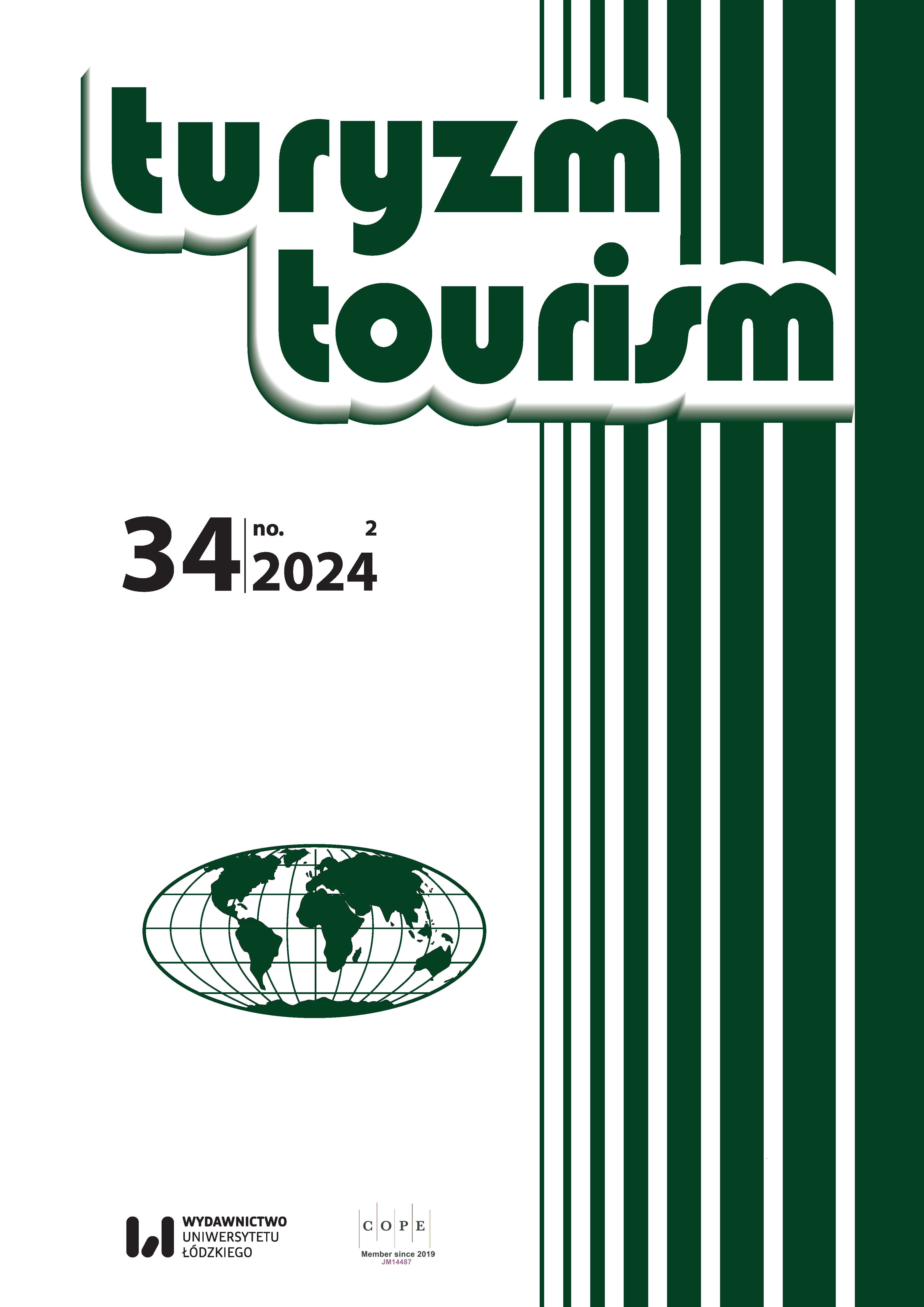The experience economy of the largest walking event in the world: The case of the Nijmeegse Vierdaagse
DOI:
https://doi.org/10.18778/0867-5856.34.2.04Keywords:
Pine and Gilmore’s realms, memorable experience, reasons, repeated attendance, sports eventAbstract
The aim of this research is to investigate the successful factors behind the largest walking event in the world, the Nijmeegse Vierdaagse in the Netherlands, through the prism of a visitors’ experience economy. The study explores the demographic characteristics of the respondents, the visitors’ reasons to attend, as well as an interpretation of their experience. A total of 327 visitors completed a survey expressing their positive recommendation for others to visit the event and the huge interest (99.4%) to re-attend. This was due to a universal level of satisfaction and the diversification of the entertainment provision amongst Dutch, German and other Europeans with a high educational level, aged 20 and above. Most visitors attended the event with their families and friends, for professional and personal training, as part of a military program or for self-development. The main reasons to take part were firstly, to observe the walkers, secondly, to support friends and family and, lastly, for the atmosphere around the city and its history. The experience has been introduced through Pine and Gilmore’s (1998) realms where all four aspects played a huge role in its successful implementation, specifically of the esthetic and entertainment realms. The participants searched mostly for harmony, a pleasant environment and differentiation of cultures. Moreover, the attendees mentioned the educational side as a simplistic curiosity rather than intentional learning, however, they still highlighted that it also mattered as a part of the successful event. Lastly, only small relevance was found in becoming a different person and experiencing a completely different world through escapism. Finally, practically all participants expressed their wish to re-attend the event considering it successful.
Downloads
References
Ali, F., Hussain, K., & Ragavan, N.A. (2014). Memorable customer experience: Examining the effects of customers experience on memories and loyalty in Malaysian resort hotels. Procedia – Social and Behavioral Sciences, 144, 273–279. https://doi.org/10.1016/j.sbspro.2014.07.296
Google Scholar
DOI: https://doi.org/10.1016/j.sbspro.2014.07.296
Andersson, T.D. (2007). The tourist in the experience economy. Scandinavian Journal of Hospitality and Tourism, 7(1), 46–58. https://doi.org/10.1080/15022250701224035
Google Scholar
DOI: https://doi.org/10.1080/15022250701224035
Aparna, K., Hendrikx, B., & Lagendijk, A. (2022). The topological arrangements of Nijmegen’s “Walk of the World”: From a military march to “martial entrepreneurialism”. Geografiska Annaler: Series B, Human Geography, 105(1), 1–16. https://doi.org/10.1080/04353684.2022.2050275
Google Scholar
DOI: https://doi.org/10.1080/04353684.2022.2050275
Bartsch, A., & Hartmann, T. (2017). The role of cognitive and affective challenge in entertainment experience. Communication Research, 44(1), 29–53. https://doi.org/10.1177/0093650214565921
Google Scholar
DOI: https://doi.org/10.1177/0093650214565921
Bernaki, W., & Marso, S. (2023). Tourist experience in destinations: Rethinking a conceptual framework of destination experience. Journal of Marketing Research and Case Studies, Article 340232. https://doi.org/10.5171/2023.340232
Google Scholar
DOI: https://doi.org/10.5171/2023.340232
Collis, J., & Hussey, R. (2003). Business research: A practical guide for undergraduate and postgraduate students (2nd ed.). Palgrave Macmillan.
Google Scholar
De 4daagse. (n.d.). Organisation. https://www.4daagse.nl/en/about-the-4days-marches/organisation
Google Scholar
Ferreira, H., & Teixeira, A.A.C. (2013). ‘Welcome to the experience economy’: Assessing the influence of customer experience literature through bibliometric analysis ( FEP Working Papers No. 4 81). Universidade do Porto. https://wps.fep.up.pt/wps/wp481.pdf
Google Scholar
Güzel, F.Ö. (2014). The dimensions of tour experience, emotional arousal, and post-experience behaviors: A research on Pamukkale in Turkey. Procedia – Social and Behavioral Sciences, 150, 521–530. https://doi.org/10.1016/j.sbspro.2014.09.069
Google Scholar
DOI: https://doi.org/10.1016/j.sbspro.2014.09.069
Henning, B., & Vorderer, P. (2001). Psychological escapism: Predicting the amount of television viewing by need for cognition. Journal of Communication, 51(1), 100–120. https://doi.org/10.1111/j.1460-2466.2001.tb02874.x
Google Scholar
DOI: https://doi.org/10.1111/j.1460-2466.2001.tb02874.x
Ho, P.T., & Tsai, H.Y. (2010). A study of visitors’ recreational experience types in relationship to customer retention in leisure farm. Journal of Global Business Management, 6(2), 58–64.
Google Scholar
Hosany, S., Sthapit, E., & Björk, P. (2022). Memorable tourism experience: A review and research agenda. Psychology & Marketing, 39(8), 1467–1486. https://doi.org/10.1002/mar.21665
Google Scholar
DOI: https://doi.org/10.1002/mar.21665
Hosany, S., & Witham, M. (2010). Dimensions of cruisers’ experiences, satisfaction, and intention to recommend. Journal of Travel Research, 49(3), 351–364. https://doi.org/10.1177/0047287509346859
Google Scholar
DOI: https://doi.org/10.1177/0047287509346859
Hwang, J., & Han, H. (2016). A study on the application of the experience economy to luxury cruise passengers. Tourism and Hospitality Research, 18(4), 478–491. https://doi.org/10.1177/1467358416682068
Google Scholar
DOI: https://doi.org/10.1177/1467358416682068
Hwang, J., & Lyu, S.O. (2015). The antecedents and consequences of well-being perception: An application of the experience economy to golf tournament tourists. Journal of Destination Marketing and Management, 4(4), 248–257. https://doi.org/10.1016/j.jdmm.2015.09.002
Google Scholar
DOI: https://doi.org/10.1016/j.jdmm.2015.09.002
Jog, D.R., & Alcasoas, N.A. (2023). Travel decision making through blogs and vlogs: An empirical investigation on how usergenerated content influences destination image. Turyzm/Tourism, 33(2), 19–28. https://doi.org/10.18778/0867-5856.33.2.02
Google Scholar
DOI: https://doi.org/10.18778/0867-5856.33.2.02
Jurowski, C. (2009). An examination of the four realms of tourism experience theory. International CHRIE Conference-Refereed Track, 23. https://hdl.handle.net/20.500.14394/42601
Google Scholar
Keskin, E., Aktaş, F., Yayla, Ö., & Dedeoğlu, B.B. (2024). The importance of nostalgic emotions and memorable tourism experience in the cultural experience. Journal of Quality Assurance in Hospitality & Tourism, 25(1), 1–21. https://doi.org/10.1080/1528008X.2022.2097976
Google Scholar
DOI: https://doi.org/10.1080/1528008X.2022.2097976
Kusumah, E.P. (2023). Destination and sport event: Image, attachment and loyalty relationship. Advances in Hospitality and Tourism Research (AHTR), 11(2), 191–209. https://doi.org/10.30519/ahtr.1100956
Google Scholar
DOI: https://doi.org/10.30519/ahtr.1100956
Lash, T.L., Fox, M.P., MacLehose, R.F., Maldonado, G., McCandless, L.C., & Greenland, S. (2014). Good practices for quantitative bias analysis. International Journal of Epidemiology, 43(6), 1969–1985. https://doi.org/10.1093/ije/dyu149
Google Scholar
DOI: https://doi.org/10.1093/ije/dyu149
Loureiro, S.M.C. (2014). The role of the rural tourism experience economy in place attachment and behavioral intentions. International Journal of Hospitality Management, 40, 1–9. https://doi.org/10.1016/j.ijhm.2014.02.010
Google Scholar
DOI: https://doi.org/10.1016/j.ijhm.2014.02.010
Mehmetoglu, M., & Engen, M. (2011). Pine and Gilmore’s concept of experience economy and its dimensions: An empirical examination in tourism. Journal of Quality Assurance in Hospitality & Tourism, 12(4), 237–255. https://doi.org/10.1080/1528008X.2011.541847
Google Scholar
DOI: https://doi.org/10.1080/1528008X.2011.541847
Mileva, S. (2023). Innovation culture as a premise for engaging and memorable tourist experiences through gamification. Turyzm/Tourism, 33(2), 83–94. https://doi.org/10.18778/0867-5856.33.2.07
Google Scholar
DOI: https://doi.org/10.18778/0867-5856.33.2.07
Nordvall, A., & Heldt, T. (2017). Understanding hallmark event failure: A case study of a Swedish music festival. International Journal of Event and Festival Management, 8(2), 172–185. https://doi.org/10.1108/IJEFM-11-2015-0043
Google Scholar
DOI: https://doi.org/10.1108/IJEFM-11-2015-0043
Oh, H., Fiore, A.M., & Jeoung, M. (2007). Measuring experience economy concepts: Tourism applications. Journal of Travel Research, 46(2), 119–132. https://doi.org/10.1177/0047287507304039
Google Scholar
DOI: https://doi.org/10.1177/0047287507304039
Pine, B.J., & Gilmore, J.H. (1998, July–August). Welcome to the experience economy. Harvard Business Review. https://hbr.org/1998/07/welcome-to-the-experience-economy
Google Scholar
Pine, B.J., & Gilmore, J.H. (2014). A leader’s guide to innovation in the experience economy. Strategy & Leadership, 42(1), 24–29. https://doi.org/10.1108/SL-09-2013-0073
Google Scholar
DOI: https://doi.org/10.1108/SL-09-2013-0073
Radder, L., & Han, X. (2015). An examination of the museum experience based on Pine and Gilmore’s experience economy realms. The Journal of Applied Business Research, 31(2), 455–470. https://doi.org/10.19030/jabr.v31i2.9129
Google Scholar
DOI: https://doi.org/10.19030/jabr.v31i2.9129
Shim, C., Oh, E.J., & Jeong, C. (2015). A qualitative analysis of South Korean casino experiences: A perspective on the experience economy. Tourism and Hospitality Research, 17(4), 358–371. https://doi.org/10.1177/1467358415619673
Google Scholar
DOI: https://doi.org/10.1177/1467358415619673
Sinkeldam, M. (2018). Four days marches Nijmegen: Walking in the heat. Retrieved from: https://outdoormedicine.org/four-days-marches-nijmegen-walking-in-the-heat/?lang=en
Google Scholar
Song, H.J., Lee, C.-K., Park, J.A., Hwang, Y.H., & Reisinger, Y. (2015). The influence of tourist experience on perceived value and satisfaction with temple stays: The experience economy theory. Journal of Travel & Tourism Marketing, 32(4), 401–415. https://doi.org/10.1080/10548408.2014.898606
Google Scholar
DOI: https://doi.org/10.1080/10548408.2014.898606
Thanh, T.V., & Kirova, V. (2018). Wine tourism experience: A netnography study. Journal of Business Research, 83, 30–37. https://doi.org/10.1016/j.jbusres.2017.10.008
Google Scholar
DOI: https://doi.org/10.1016/j.jbusres.2017.10.008
tom Dieck, M.C., Jung, T.H., & Rauschnabel, P.A. (2018). Determining visitor engagement through augmented reality at science festivals: An experience economy perspective. Computers in Human Behavior, 82, 44–53. https://doi.org/10.1016/j.chb.2017.12.043
Google Scholar
DOI: https://doi.org/10.1016/j.chb.2017.12.043
Vorderer, P. (2001). It’s all entertainment – sure. But what exactly is entertainment? Communication research, media psychology, and the explanation of entertainment experiences. Poetics, 29(4–5), 247–261. https://doi.org/10.1016/S0304-422X(01)00037-7
Google Scholar
DOI: https://doi.org/10.1016/S0304-422X(01)00037-7
Walls, A.R., Okumus, F., Wang, Y.(R.)., & Kwun, D.J.-W. (2011). An epistemological view of consumer experiences. International Journal of Hospitality Management, 30(1), 10–21. https://doi.org/10.1016/j.ijhm.2010.03.008
Google Scholar
DOI: https://doi.org/10.1016/j.ijhm.2010.03.008
White, J.T., Hickie, J., Orr, A., Jackson, C., & Richardson, R. (2023). The experience economy in UK city centres: A multidimensional and interconnected response to the “death of the high street”? Urban Studies Journal, 60(10), 1833–1852. https://doi.org/10.1177/00420980221143043
Google Scholar
DOI: https://doi.org/10.1177/00420980221143043
Yarborough, M. (2021). Moving towards less biased research. BMJ Open Science, 5(1), 1–7. https://doi.org/10.1136/bmjos-2020-100116
Google Scholar
DOI: https://doi.org/10.1136/bmjos-2020-100116
Downloads
Published
How to Cite
Issue
Section
License

This work is licensed under a Creative Commons Attribution-NonCommercial-NoDerivatives 4.0 International License.










